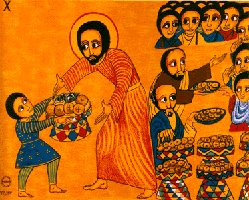Cultural Hermeneutics
8 Comments Published by Jake on Wednesday, February 15, 2006 at Wednesday, February 15, 2006. Greetings to all!
Greetings to all!Our next Atlanta Emergent Cohort meeting will be Tuesday, February 28th from 8-10 PM. This month we will be meeting at Athens Pizza on the corner of N. Decatur and Clairmont, near Emory Univ. Click here for directions. Athens Pizza has great food, so you'll probably want to come hungry!
This cohort will be facilitated by Eric Barreto. Eric is a second-year PhD student in New Testament at Emory. He has worked extensively on the issues of cultural and contextual hermeneutics and will be a wonderful catalyst for a discussion on how our respective subjectivities impact how we read the Bible. Below are the exerpts that Eric would like us all to read prior to the cohort meeting. If you have access to these books go ahead and bring them. Click on the links below to download the PDF versions of these pages.
1. Miguel A. De La Torre, Reading the Bible from the Margins (Maryknoll, NY: Orbis Books, 2002). This book is more accessible than the other reading. If biblical hermeneutics is a newer concept for you, start with the introduction of this book, pp. 1-35. If you'd like, move on to the second reading.Pass this info along to your friends and we will see you at Athens Pizza on the 28th.
2. Brian Blount, Cultural Interpretation: Reorienting New Testament Criticism (Minneapolis: Fortress Press, 1995). This reading is more challenging but quite important in the scholarship. If you are already engaged in the conversation revolving around biblical hermeneutics, start here. Read the introduction, pp. 1-23.
Peace,
Jake

I enjoyed the conversation last night. It is nice making the drive over to Atl ~ meeting new friends and having discussion.
I wish that we would have explored, "Reading from the Margins" a little more though.
Hey all - I had some thoughts about the conversation last night that I put in my blog b/c they are so long. Feel free to comment here instead of there to keep the rest of the Cohort in the loop.
Tim:
I liked your analogy. One of the problems that I have ( not sure if that is the right word ) is the following:
I am all for learning and listening from all sides of the issues.
But is there a "right side". At times as I read, Reading from the Margins, I got the feeling that he was promoting the "margins" as having it "right"
I know what you mean. To some extent though, it is perhaps true that the margins are always right - the Bible was primarily written/compiled from the margins throughout its history. So, it would seem that whoever is in the margins of any given society might have a better grasp of the perspective of those who gave us our scriptures. What do you think?
In the end I would also question the idea that any interpretation can definatively be called right though, whether it's marginal, or from the Pope, or from me!
tim:
that is a very interesting concept.
then though, I swing into ... " alright, that is great .. however, the individuals that I work with are not from the margins .. so ...
I am just trying to grasp my hands around it and thankful that God allows me to journey without all the answers and I live in a community of grace where we are traveling together .. just trying to get a glimpse of what God wants us to be.
I see your point about the challenge of privileging the marginalized voices when you (I) and our congregations are not from the margins. the challenge is to learn from the marginalized and reach for connections. you can see this brilliantly in Jesus' illustration of a theology of neighboring (good samaritan): taking place in the ordinary place of a regularly travelled road (marginalized by its ordinariness) and exemplified by the practices of the outcast (marginalized for heretical practices) for the good of the wounded (marginalized by his grotesqueness in an appearance and immediacy driven culture).
Troy:
I would like for you to dive deeper with your illustration and showing where / how we can take that example from your perspective.
What "insight" would be gained from the marginalized ?
Hey, I hope that you don't mind my joining the conversation.
I would suggest a book that I have found really helpful as I try to answer this question above. "The New Global Mission, The Gospel from everywhere to everyone." by Samuel Escobar.
In this book Escobar states, "Precisely at the point at which the influence of Christianity declines in the West, the new global order has brought the so-called Third World into the heart of North America and Europe. Within that environment Christians from old and new churches are called to new partnerships to participate in mission on their on doorstep as well as in global mission. For the old, traditional denominations, partnersips with the new immigrant churches brings the need for serious self appraisal. This is not easy for respectable, middle class evangelical churches that have a steadier, institutionalized, well-mannered, predictable kind of church. "Mission at our doorstep" may well become the new training ground for the new partnerships that will also carry on mission around the world."
I would also encourage the reading of the book "Life on the Vine, Cultivating the fruit of the Spirit in Christian community." by Phillip Kenneson. This book presents a challenging look at values in our Western culture that may indeed be "weeds", choking the western church.